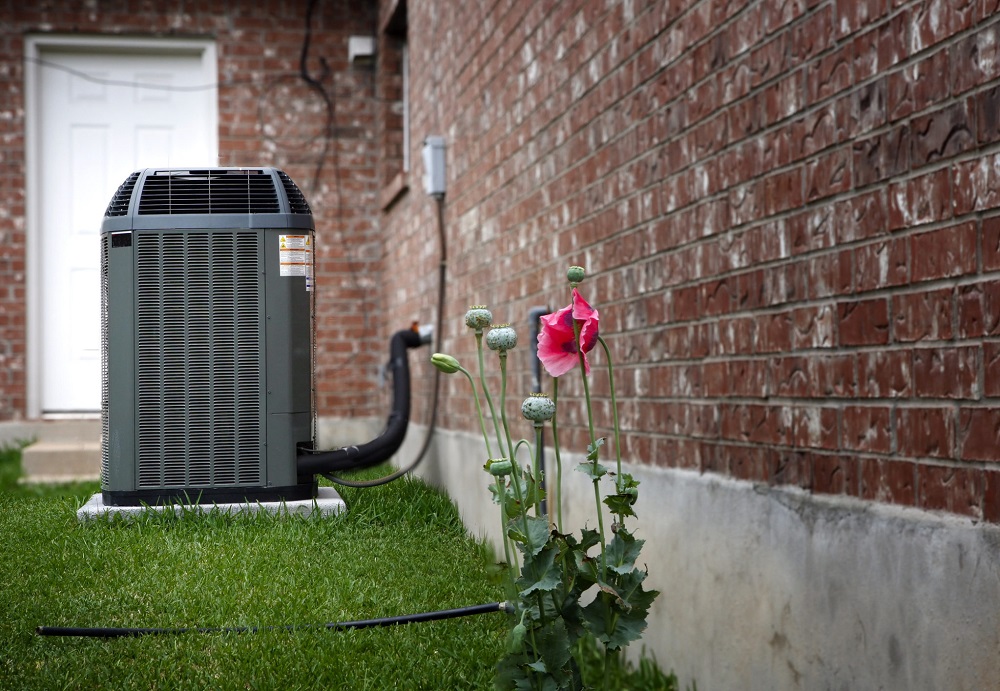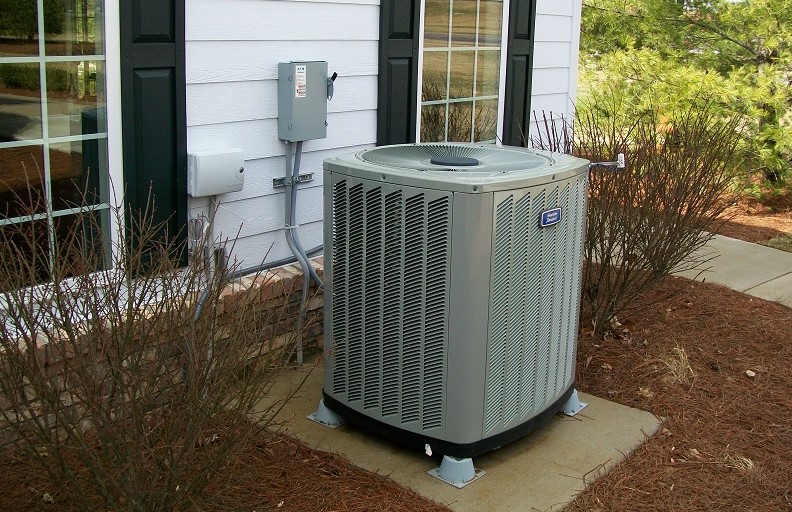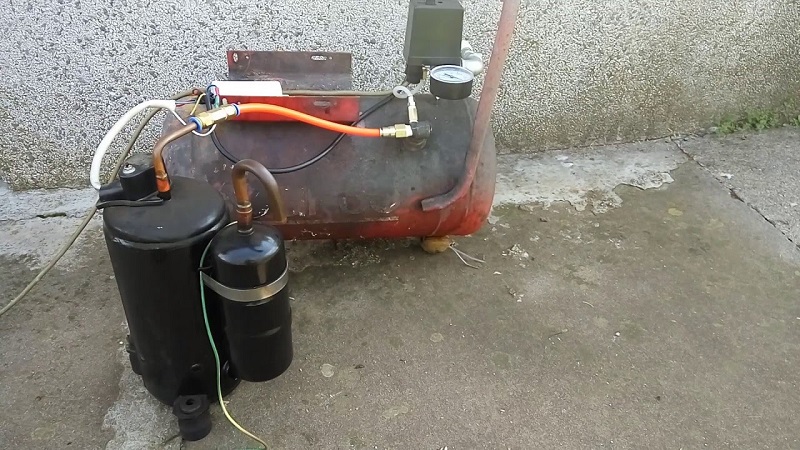You may wonder how an air conditioner compressor works and why it’s important. Let’s clarify that: The compressor is the heart of your A.C. system and nothing can continue to work without a heart (HVAC)! Therefore, Linquip is here to explain how air conditioner compressors work and how to avoid damaging the system with wrong maintenance. Now let’s dive into knowing AC compressor working principles.
How an air conditioner compressor works is that the compressor pumps refrigerant throughout the whole system. But what is a refrigerant? This fluid is responsible to take the heat away from inside the house and dump it outside.
The condenser (outdoor unit) transfers the refrigerant to the evaporator (indoor unit) with the help of the compressor pumping the cold fluid from the first one to the second The refrigerant then absorbs the heat inside the house. The filter inside cleans the air impurities and the heat then turns the refrigerant into vapor by passing through the evaporator coils when it reaches the maximum amount of heat it can hold, the vapor will move back to the air conditioner compressor and thus takes the heat with it. The main task of the air conditioner compressor is to raise the temperature and pressure of the vapor refrigerant that leaves the evaporator coil.
The outdoor unit then heats up the refrigerant to turn it into a superheated gas and the heat will move into the cooler outdoor unit. As the heat moves away from the refrigerant, it slowly gains its liquid form once again. Then the compressor pumps it back into the evaporator and the process happens over and over again.
The result of this process and the way air conditioners compressor work, is that your home reaches the desired temperature and the clean, dry air is vented into the room as cold air.
Different types of air conditioner compressor
There are five common types of AC compressors used in the HVAC industry based on the system’s design and needs: Reciprocating, Scroll, Screw, Rotary, and Centrifugal.
The Reciprocating air conditioner compressor works with a piston as a part of the compressor to deal with the refrigerant. This refrigerant is driven by a crankshaft in a back and forth motion throughout a straight line.
The Scroll air conditioners compressor uses a fixed scroll and an orbiting scroll rotates with the help of swing link which eventually reduces the volume of the gas by pushing the pockets of refrigerant to the center of the two scrolls.
The Screw air conditioner compressor works with a pair of helical rotors. They compress the gas trapped inside with the movement of these rotors in the cylinder.
The Rotary air conditioner compressors either use blades or vanes rotating with the shaft or they use a stationary blade as a part of the compressor housing assembly. In these two types, the vapor is pushed into the cylinder through the suction port.
And the Centrifugal air conditioner compressor with the centrifugal force moves the vapor in a circular motion. Then a disk with radial blades known as an impeller rapidly spins inside the housing. Due to these movements, the gas gains velocity, and then the diffuser converts the produced energy into pressure. Then it discharges into the condenser and the rest is the same as other air conditioners.
The functions of air conditioner compressors
What they do during the whole process is create pressure; raise the temperature, push the humid air into the condenser coils, eliminate humidity, compress the liquid, removing and condense hot refrigerated gas are all among the tasks that an AC compressor does during the time that your air conditioner is on.
Air Conditioner Compressor maintenance
If there’s something wrong with your air conditioner compressor and it seems that the aircon compressor is not working properly, there are some tips and tricks to follow that might help your system get up and running quickly.
Air conditioner compressor maintenance is as important as any part of it. Right maintenance eliminates the downtimes and keeps your system’s efficiency at the maximum level for a longer period of time. Knowing that the compressor is really expensive will persuade you, even more, to look after this valuable unit. With the right maintenance, your compressor lives up to fifteen years.
- Clean the system
Clean the system and its units regularly to avoid any buildups of bugs, dirt, dust, etc. When the fins of the condenser are dirty, the efficiency of the system decreases and it damages the compressor.
- Provide enough space for your outdoor unit
Keep the outdoor unit’s surroundings clean and empty for at least 3 feet. Any shrubs, fences, tree limbs, etc. should be removed from its surrounding. And forget about decorative covers! The area should be empty to increase the system’s efficiency. One of the important air conditioner compressor works is that it dumps the heat, so if you suffocate the outdoor unit, the process becomes hard for the compressor, leading to overheating and a broken unit!
- When the temperature is not right
Sometimes you can feel the efficiency of your device is decreasing which can be due to a refrigerant leak. When the AC is on constantly but the temperature does not change, when there are frosts or ice on the refrigerant coils, when you hear noise from the refrigerant line and when the energy bills hit the roof, that’s when you know there’s something wrong with your air conditioner. Then, the pressure on the compressor increases as it tries to circulate enough refrigerant through the air conditioner to cool down the house. Don’t forget to call a technician as soon as you see one of these signs. If you don’t take action immediately, then you’ll probably end up with a broken device and have to spend a lot of money to get it back on track.
- Regular maintenance check-ups
Set an appointment with a technician at least twice a year for AC maintenance. Trust me; you’ll save a lot in the long run with the right maintenance.
These were the most important items on the A/C maintenance checklist that you should keep an eye on. Don’t forget to read the manual of your air conditioner to learn how to maintain yours better and maximize its efficiency with proper care.
Common Air Conditioner Compressor Problems
There are some common problems you might run into when owning an air conditioner. Problems like:
- Aircon turning on and off
If your air conditioning unit frequently turns on and off, it may have something to do with the way your air conditioner’s compressor work. This problem increases energy consumption which shows itself on the power bill. So, take care of it as soon as possible. Keep in mind that the compressor might be one of the many reasons causing this problem. It can be simply due to a broken wire or a busted fuse. Check the fuse and wiring first and then take actions for troubleshooting.
- Aircon Not Cooling
If you feel a decrease in the efficiency and signs of reduced cooling, then try a few steps like cleaning the AC and making sure no dust or dirt has been blocking the indoor and outdoor unit. If the problem persists, it’s probably a broken compressor that needs changing or simply repairing.
- AC Overheating
The constant use of air conditioners may result in overheating the system. When you turn on the system and feel extreme heat coming out of the device for a few minutes, then you’re probably in trouble. Irregular maintenance, not cleaning the device, broken parts, or busted wirings may cause such a problem. If these were not the problem, then check the elements inside the compressor and you may find the problem there.
- Compressor motor not starting
If the compressor motor doesn’t start at all, you should check the start capacitor. Some units don’t come with start capacitor. In this case, only an expert can help you troubleshoot the problem. But it’s advised to install one since they are really helpful for proper maintenance.
Now that you know the importance of the compressor and how an air conditioner’s compressor work, let Linquip hear your experiences with this system and share your stories with us in the comment section. Have more questions? Feel free to sign up on Linquip and our experts quickly answer your questions.
Buy Equipment or Ask for a Service
By using Linquip RFQ Service, you can expect to receive quotations from various suppliers across multiple industries and regions.
Click Here to Request a Quotation From Suppliers and Service Providers
Read More on Linquip
- Reciprocating Compressor Parts: A Simple, Yet Useful Guide
- Reciprocating Compressor: Introduction, Efficiency & Types
- Difference between Refrigeration and Air Conditioning: Comparison
- How to Increase CFM on Air Compressor? (Clear Guide)
- The Essential Guide to the Types of Air Compressors
- How Does a Centrifugal Compressor Work?
- Your Complete Guide to Air Conditioner Replacement Cost
- Everything You Need To Know About Different Types Of Compressors
- How does an Air Conditioners Compressor Work?
- 3-phase air compressor: what is it and how to wire it
- Difference Between Air Compressor and Air Pump
- Piston compressor vs screw compressor; Which One Should I Buy?
- What is a Compressor Used For?
- How Much Does It Cost to Replace A Compressor in An Air Conditioner?







I would like to appreciate the hardwork and research that went into writing this very guided blog on how air conditioners compressors work and is a must read for anyone who is curious to know the working principles behind their functioning. Your HVAC system’s refrigerant can’t cool your home and remove heat from the air without a compressor. Maintaining the AC compressor is very important, as it keeps efficiency at its maximum level and reduces the slowdowns. The lifespan of your AC compressor and refrigerant should be 12–15 years. Understanding the essential parts of your AC and how to care for the compressor can help it function effectively for the duration of its useful life.
Thanks for sharing your experience with us! You can also visit our industrial directories, where you can find thousands of various industrial equipment based on your application and demand.